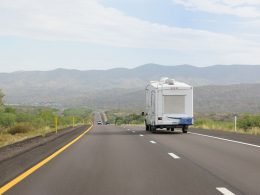Nomads have been embracing unique ways of traveling for years. Two popular options for full-time living lately have been boats and RVs.
There will be benefits and inconveniences no matter what type of dwelling you choose. You must do the research and find the best for your unique circumstances to get the most out of whichever lifestyle you embrace.
Today, we’re digging deep to discover the truth about living on a boat versus full-time RV life. Let’s get started!

Is It Cheaper to Live in an RV or a Boat?
There are many factors to consider when comparing the costs of living in an RV and a boat. It’s possible to embrace both lifestyles luxuriously or budget-friendly. The costs associated with purchasing, maintaining, and fueling them can be comparable.
However, while both RVs and boats can allow you to boondock or anchor offshore for free, the costs of paid stays can vary greatly. When you book a campsite for your RV, you’re likely paying a flat rate for the site. You may pay an additional fee if you want 50 amp service instead of 30 amp.

However, prices for campsites in a campground are typically the same when the amenities are equal. You’ll normally expect to pay $20 to $35 per night for most state parks and other public campgrounds.
When reserving a spot at a dock, most will charge by the foot. Depending on the dock, you’ll find fees ranging from $1 to $4. Some boats are well over 40 ft to 50ft long, which can easily bring the cost of a spot in a dock well over $100 per night in most cases.
Owning a smaller boat could help keep the costs down, but an RV will be the cheapest option in most cases.
HOT TIP
Can you save money living in a van versus renting an apartment? 📦
What Is Life on a Boat Like vs. an RV?
The possibilities are practically endless for life on both boats and RVs. Both vessels can allow the adventurers to travel to new thrills and discover places they’ve never seen. However, there’s a major difference between the two regarding day-to-day life.
When you park your RV, you typically can also use the land around it. This can expand the amount of liveable space and provide room to spread out. The RV itself can be the living quarters that you’ll likely retreat to at the end of the day or when the weather isn’t cooperating.
If you choose to live on a boat, the area around it isn’t as functional. When docked, the space around the dock is often shared with neighbors and doesn’t provide much space to use.
You can swim, paddleboard, or play in the water, but it’s not the same as solid ground. If you don’t enjoy spending a tremendous amount of time in a tiny space, living in a boat can be extremely challenging.
What Are the Pros and Cons Of Living on a Boat?
If you’re comfortable spending a tremendous amount of time on the water, a boat isn’t a bad option. Let’s look at the pros and cons of living on a boat to see if it’s right.
Pros
When necessary, boating can be very affordable. A budget-friendly boat in good condition can be a great way to jump into the lifestyle.
Embracing life on a boat means traveling from dock to dock, seeing exciting new places, and making a lifetime of memories. It’s an eco-friendly way to live life and reduce your energy consumption and impact on the earth.
Also, living on a boat naturally makes you a part of the boating community. They have a deep sense of community and look out for each other’s safety.
As more people embrace the lifestyle, the community is becoming incredibly diverse. You’ll rub shoulders and share docks with other boaters from all walks of life.

Cons
Despite boats being wider than RVs, they don’t come with slides that expand the space. With boats, what you see is what you get.
You also have to factor in that they typically never stop moving. Even when anchored or parked at a dock, there will be movement. Tossing the anchor overboard will cause you to swing and circle whichever way the wind takes you.
Living on a boat can be very hard work. You’re constantly moving, and you have to be considering your safety and security constantly.
While a mistake in RVing could result in an injury or damage to property, a mistake while living on a boat could result in it and your possessions being at the bottom of a body of water.
HOT TIP
Sailboat Life Confessions: 5 Worst Things About Living on a Sailboat ⛵️
What Are the Pros and Cons of Living in an RV?
If the idea of constantly floating around on water doesn’t settle well for you, then RV life might be for you. Again, it has its pros and cons, and it’s important to consider both before heading down to buy an RV. Let’s take a look!
Pros
Living in an RV provides a tremendous amount of freedom. There are thousands of campgrounds across the country where you can park your rig.
If you want more privacy or to spread out, you can take advantage of the thousands of campsites on public-use lands managed by the Bureau of Land Management (BLM) and the United States Forest Service (USFS). In some instances, you can stay on these public-use lands for 14 days for free or for a nominal fee.
Traveling in an RV allows you to take your entire house on the road with you. Once you find a spot to park, you can drop your jacks and enjoy almost all of the comforts of life in a standard sticks-and-bricks home. Some larger RVs have multiple bedrooms, bathrooms, and storage space to bring toys with you to help enhance your adventures.
Life in an RV can provide you with many opportunities to enjoy nature. Parking amongst trees and watching wildlife in its natural habitat can give you a whole new appreciation for our planet. You’ll become more aware of the impacts we can have on it and how it is our responsibility to take care of it.

Cons
Even the largest RVs are still relatively small. A 40-foot RV isn’t much larger than 300 square feet. While these rigs can seem open and very spacious when shopping for your rig, you have to remember everything you’ll bring with you.
Your possessions will quickly eat away at the 300 square feet. You also must be aware of everything you’re adding to your RV to avoid exceeding the cargo-carrying capacity.
You also want to prepare yourself for the inevitable repair you’ll need to make. In RVing, it’s not whether something will break, but when. Your RV experiences an earthquake-like experience every time you tow it down the highway.
Something will eventually come loose or break, and you’ll need to fix it. Hiring someone to fix everything that breaks on your RV can get very expensive, so you’ll need to become a jack-of-all-trades if you don’t have a deep wallet.
Traveling in an RV can be very stressful. Some roads are more RV-friendly than other roads. You’ll need to research and plan your route to avoid low clearances and restrictions. You can find yourself in a dangerous situation if you don’t plan properly.
Is It Realistic to Live on a Boat or an RV?
There are thousands of nomads traveling full-time in boats and RVs. They’re beautiful lifestyles that can provide life-changing experiences that wouldn’t have been possible otherwise.
It can take some adjustment to live on a boat or in an RV, but it’s possible. You may have to make sacrifices and leave some stuff behind when you head out for an adventure, but the pros far outweigh the cons.
Is It Better to Live in an RV or a Boat?
The great thing about life is that there’s no one-size-fits-all way to live it. What works for one person might not work for another.
Both lifestyles can be great for new adventures, saving some money, and experiencing personal growth. However, they’re not for everyone as they both require quite an adjustment and sacrifice to get the most out of them.
Would you rather live in an RV or a boat?
If You Want the Latest Travel News, Join Our Mailing List
Don’t rely on biased RV industry news sources to keep you informed. Stick with Nomadic News. We publish articles and breaking stories that matter to you every weekday.










